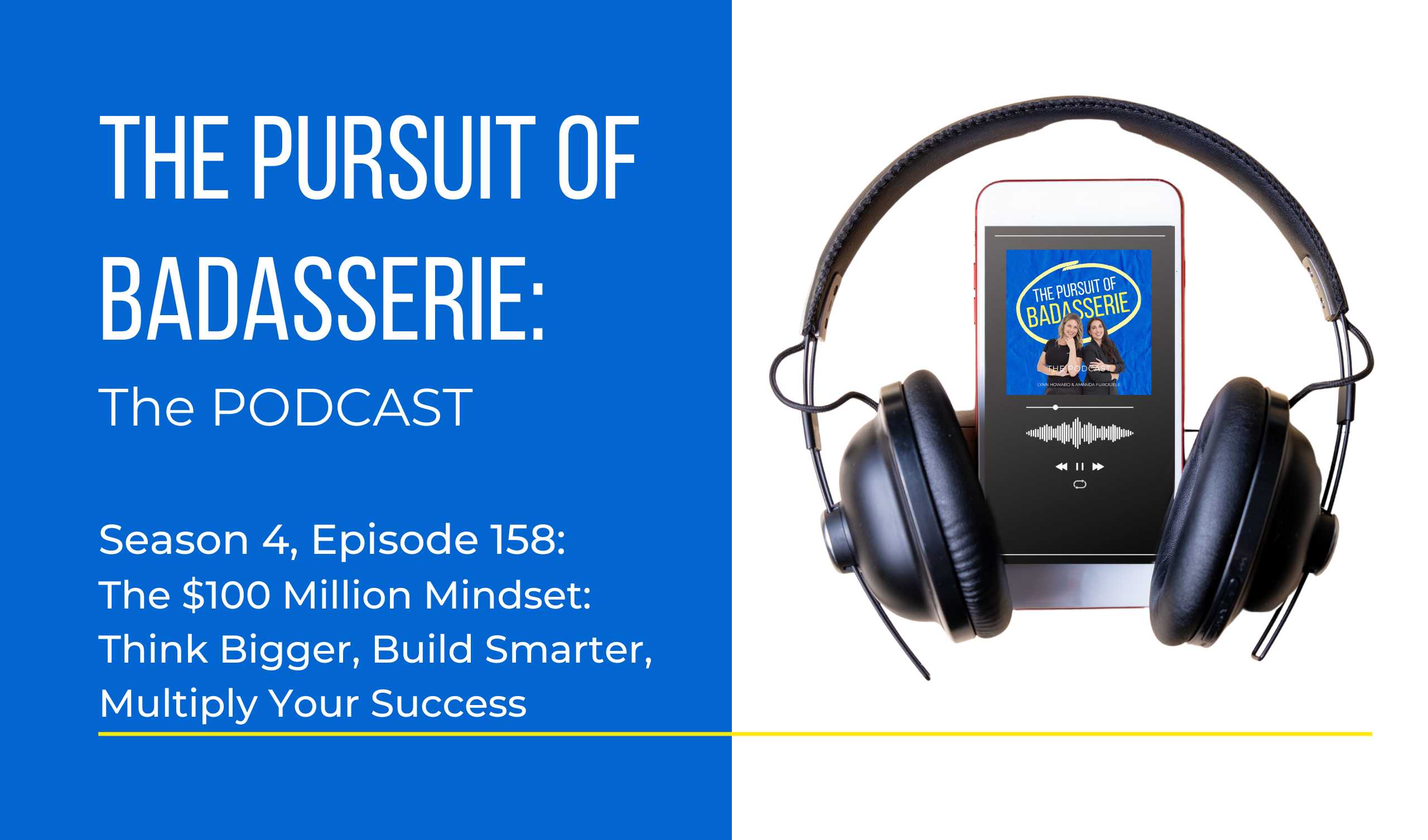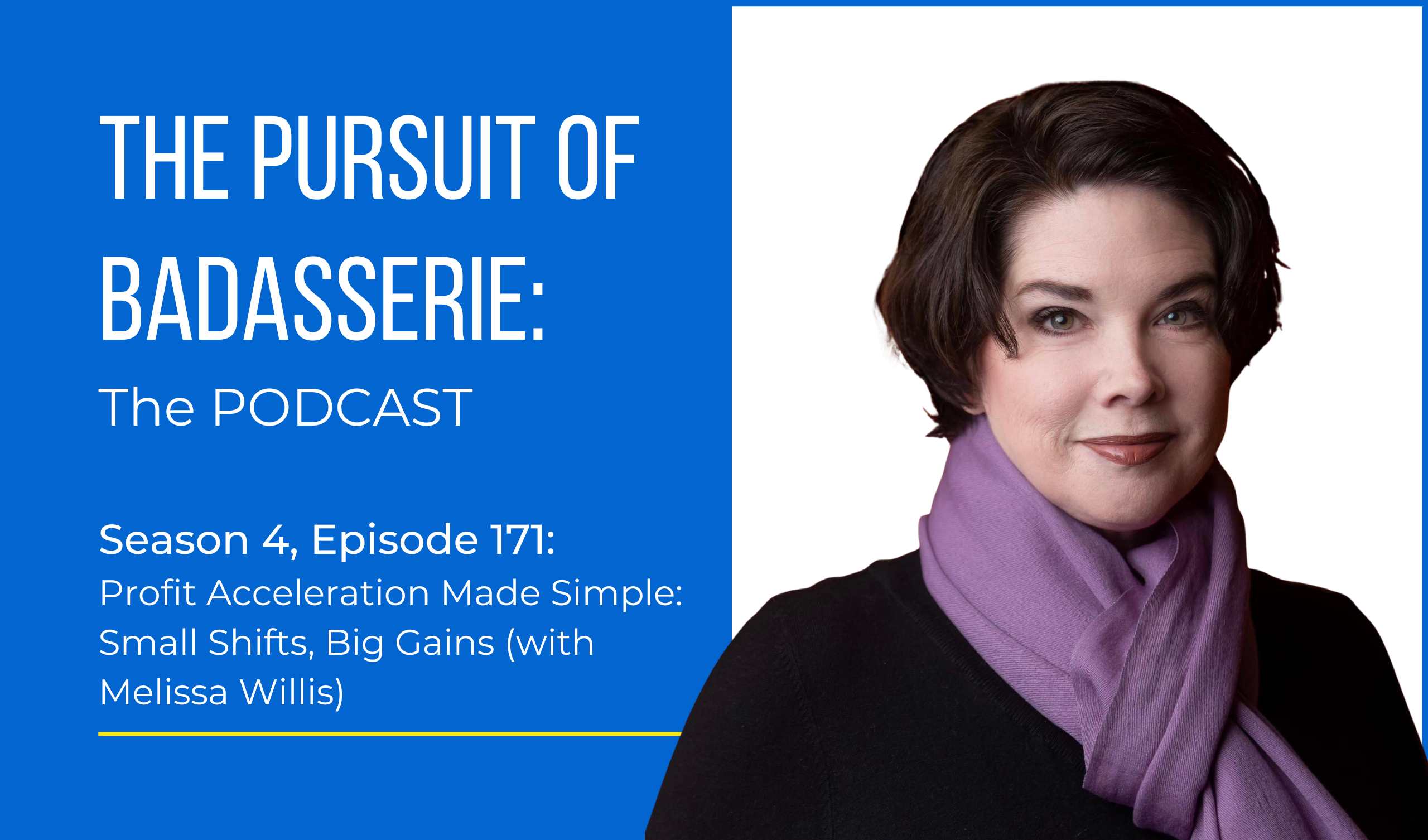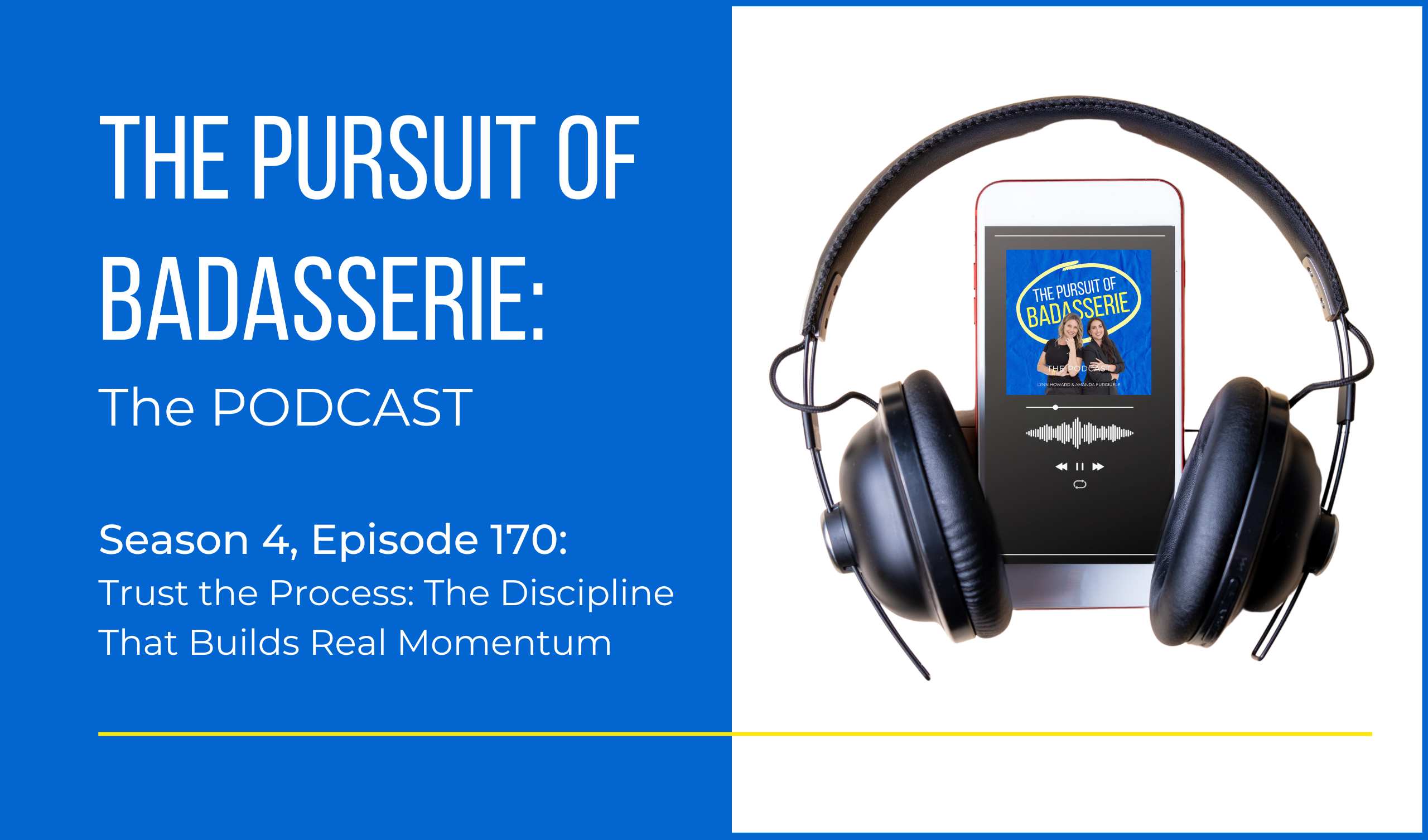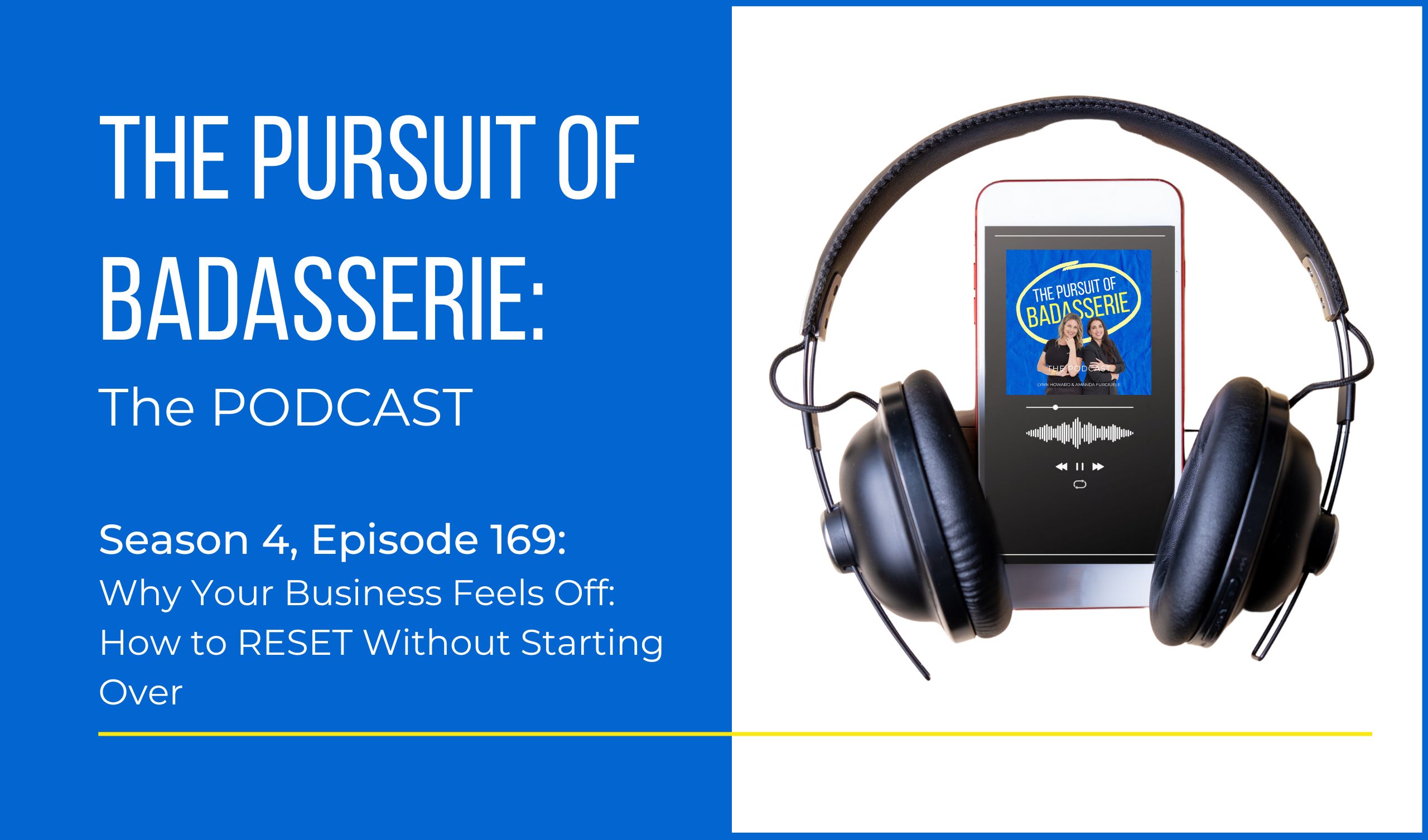Episode 158: The $100 Million Mindset: Think Bigger, Build Smarter, Multiply Your Success
In this episode of The Pursuit of Badasserie, we dive deep into what it really means to have a $100 million mindset—and why thinking bigger is the ultimate game-changer for entrepreneurs.
They break down how top performers approach business differently: from proactive problem-solving and strategic hires to leveraging ROI and building systems that work without you. Learn how to shift your mindset from just making money to multiplying income, compounding growth, and scaling a business that doesn’t need you to survive.
We also share practical steps to start shifting your mindset today, including SWOT analyses, delegating effectively, building dashboards, and planning for long-term scalability.
If you’ve ever wondered how some business owners seem unstoppable while others stay stuck, this episode is your blueprint for thinking bigger, smarter, and bolder.

Key Takeaways:
- Why a $100 million mindset is about multiplication, not addition
- How mindset sets your ceiling and capacity in business
- The role of systems, automation, and team leverage in building scalable success
- Practical steps to shift your thinking and grow your business without working harder
Make sure to subscribe to our YouTube or Spotify and leave us a review!
- Like the show? LEAVE US A REVIEW wherever you listen!
- Have a question? CONTACT US at info@thepursuitofbadasserie.com!
- Want to sponsor us? Find out how HERE.
…
Read the full transcript of this episode below:
Lynn Howard
Hey there. I’m Lynn
Amanda Furgiuele
And I’m Amanda. Welcome to the pursuit of badasserie, the podcast. Today we are talking money, specifically the $100 million mindset.
What does that mean? What does it look like? And how can you get on this bandwagon?
Lynn Howard
I don’t know why, but this made me think of Grant Cardone, the 10 X. And I know we talked about that in a podcast or two and, um, yeah, it’s, you know, we talk a lot about CEO mindset.
It is part. Part our marketing, part of our message, and it’s definitely what we help people do, like in our badassery programs and different things like that.
And there is a, you know, even if we go back to the e-myth kind of version of like, depending on your mindset, regardless of what hat you wear in your business, will give you a ceiling and a capacity, if you would, in what you can accomplish, because your mindset is such, right?
So when you can switch your mindset to be really in a $100 million mindset, it gives you a higher capacity.
Now, that might feel really scary to you right now, to think of $100 million, you know, yeah, everybody wants it.
Not everybody, actually. I know people who wouldn’t want that, but crazy. I know. With that being said, what is your $100 million mindset?
So stretching yourself to be able to expand that mindset, to be able to think bigger is what this really is about, but we’re going to talk about the $100 million mindset.
Okay. So going back to the $100 million mindset, besides the 10X rule, I think of like $100 million mindset isn’t thinking about the little , isn’t thinking about all the tasks that they have to do.
They’re looking at the results. They’re looking at the bigger picture. They’re solving problems, big problems, typically before they happen.
They’re thinking like they’re really proactive and looking at that, that big potential and possibilities. And what are all the different ways that we can get there?
And what’s the smartest way to do that right now? They’re hiring people to help. They understand like The value of money differently.
I feel like I can go on and on.
Amanda
Oh, yeah. I mean, it’s funny. The first thing you talk about is how scary it can be to have this hundred million dollar mindset.
And my challenge for that is like, that’s where you should feel like you should feel scared by how amazing your goals are.
You should feel a little bit like, I don’t know if I can get there. I don’t know if I can even do that.
If you don’t have a little bit of apprehension, then I’m not sure you’re pushing yourself enough. But when it comes to the million dollar, you know, the million dollar mindset, the hundred million dollar mindset, when you’re thinking on a larger scale, you’re not thinking of simple addition, like you’re thinking multiplication.
And that’s why they talk about, you know, we talk about the 10 X, like it’s 10 times it’s multiplication.
It’s not addition, because instead of it being, oh, I, how can I make $10,000 this month? It’s how can I build a system that builds $10,000 every month forever?
And I don’t have to be there for it. Like, that’s the shift. So it’s, even though it’s my, even.
Maybe you both want to make $100,000 this month, one person’s thinking that’s all they want to make, the other person has shifted their mindset to say, how can I build a system that’s going to do that forever without me being there?
So it’s being obsessive about your hires and making sure you’re hiring the right people, smarter people, better people than you, being obsessed with your ROI.
Really thinking about every dollar, every hour, every resource that you have is an investment. And if it doesn’t produce measurable return, then it’s going to get cut one way or another.
Maybe it’s delegated or delegated to the trash, but there has to be strategic leverage there. There has to be financial leverage.
And I think that’s one of the major parts. You’re building assets, not just income. You’re building a system. You’re building the future.
You’re not building just one thing at a time. And, you know, throwing spaghetti at the wall.
Lynn Howard
Yeah. Three words I took out is like, you’re solving problems even before they happen. So you’re not firefighting, you’re preventative solving, you’re building things at scale.
So you’re looking at scalability, reverse engineering, and from a hundred million dollar mindset, not from this year and the automation of things that’s SOPs, that’s the tech, that’s all of the different things that you can automate, which then leads you into the people with a hundred million dollar mindset.
Cause you talked a lot about hire and you know, even when you don’t need them is if you are building currently a company or business that can’t work, can’t work without you, let alone grow without you, um, then you have a job, you have a seat, a definite ceiling that you’re going to hit in the near future.
So the people with that. A lot of times the employees don’t even know who they are in some aspects because they’re there to bring on the right team.
And I love that you said, bring people on that are smarter than you and know if you’re an or you’re not taking care of them, then yes, they might steal your trade secrets and like do a takeover or whatever.
It doesn’t happen that often, but if you can see it for what it’s worth and like, look at it and say, okay, I’m going to bring on the right people.
I’m going to treat them great. We’re going to be collaborative. We’re going to build this together. It’s still my company, but we’re, we’re in this together and you take care of them, even if they do leave and go, if, if you treated them with respect, if they were a good person, if you treat with them, respect and all these other things, then when they leave, they’re not going to, they’re not going to on you.
I mean, so they’re not going to steal all of your trade secrets and stuff. It doesn’t mean that. They might not like have some of the staff, I mean, unless they’re a horrible person, thinking of one situation in particular, like that particular person, I can’t name names.
He’s a horrible person. So he’s going to obviously take it and do things. I’ll stop on that. So, so with that being said, they are built people with a hundred million dollar mindset that are building businesses when I just got chicken skin, that people, sometimes they don’t even know it.
Damn, I need to make some, I need to make some changes doing this podcast. I’m having all these like little downloads, like, dang, I need to, I need to make some shifts anyway.
Amanda
For sure. But, you know, I think, I know, I think both of us, whenever we get on a podcast, like it’s like the information just starts downloading, like, oh, that’s right.
We need to do the things that we say. But, you know, I think when it comes to the hundred million dollar mindset, it’s not quick wins.
It’s, this isn’t instantly building that you’re building a company. playing. yeah. Okay. For companies that are long haul, 10, 20 years out, I think, you know, even when we started Bad Astry, neither of us thought it was going to be like a one and done thing.
We were both thinking, how does this scale, what is this going to look like 10 years down the road?
What is this going to look like without us in it, even though, you know, we’re obviously the face in some different ways.
I think that you have to have that bigger, broader vision is not going to be quick wins. This isn’t going to be like, how can I make a quick buck?
It’s how can I optimize? How can I, you know, use my investments wisely? How can I use other people’s money?
How can I shift the way I grow? How can I solve a bigger problem? How can I get a bigger piece of whatever crowd I’m in?
So like, instead of worrying about competition, like dominate, like don’t, don’t compete, dominate. Think about. How can you get your part where your name becomes synonymous with that thing?
I think bigger, like systems, scaling, all those things, that’s all part of, and I think even an exit strategy is part of the game, like building companies with the valuation in mind, thinking about even if you never sell them, what would that look like?
Having clean books, having recurring revenue weeks, talked about that in a previous episode, talking about your SOPs, talking about your brand positioning, those are all things that make a business more sellable and more profitable, even if you don’t ever choose to sell it, but you still have that exit plan in mind, because that’s what’s going to scale your business.
Lynn Howard
Yeah. Yeah. Uh, and a hundred million dollar mindset also like they’re building a business, um, and they’re expanding their boundaries and also they’re, you know what, they’re doing things and roll up their sleeves because, and a lot of
These people, they get down and dirty with it, but they’re always working themselves out of it. And so things aren’t too good for them.
I mean, maybe some people who have a lot of money, but I’m talking about, Amanda and I, we’ve said it a kajillion times, we’re bootstrappers.
So we come from that kind of mindset of the grittiness. And a lot of people with $100 million mindset, yeah, they’ll hire people, but they’re also not afraid to roll up their sleeves and get dirty with it.
But if you have $100, if your boundaries are around $100 mindset or $100,000 mindset, then $100 million is going to stretch you.
So you need to up-level your boundary mindset as well and the things that you would do. I also think $100 million mindset people aren’t sweating the small stuff.
They realize it’s part of the bigger process. And so getting the panties and a bunch for all the little things is ridiculous because they’re.
They’re looking at, uh, always a bigger picture. Um, I think also like it’s when I keep envisioning like the ease of a person, they’re serious, but there’s an ease of a person because they’re not sweating the small stuff.
They’re not getting into the chaos or the weeds as we like to talk, uh, like to say, um, it’s more about simplicity and scalability, like how can, and duplication, right?
So that compounding effect, um, and, uh, like stepping out, like not afraid to try new things and a fail and understand that failure is a part of the process.
Um, there are, I mean, and then adding in the CEO mindset, that CEO energy and like running it, right.
So making sure that we are, we have that CEO mindset in it as well. I think there are two different mindsets.
Amanda
But they marry well together. Well, I think you can’t have one without the other. I I guess you can have the CEO mindset and not have the $100 million mindset, but I think you can have the $100 million mindset without having the CEO mindset.
I agree. I agree. It’s square versus the rectangle. And it really is a long game. This is building companies that matter, leveraging your debt and capital, hiring smarter, being obsessed with your ROI, building assets, and really thinking on the multiplication side of things.
Like you are multiplying your income, compounding the interest, thinking big. And I know this is a hard topic for a lot of people who didn’t grow up with a money mindset or who don’t have the money mindset.
And I didn’t necessarily grow up in a family that was money mindset oriented. Because of all the children, my parents and my parents had four kids and I’m the youngest and I’m the only one who’s really obsessed and has a money mindset.
So for better or for worse, my siblings all do well, but it’s on the forefront of my mind all the time.
I’m always thinking about it. So I don’t think it’s necessarily about how you were raised. I think that can certainly contribute to it.
You obviously have the books like the rich dad, poor dad kind of thing. But ultimately, it’s not really about where you started.
It’s about where your mind goes to, like how you can build those things. We’ve seen a million underdog stories of the nobody becoming a millionaire or whatever.
So it’s that millionaire and hundred million dollar mindset is not systemic really. It’s not how you were raised. You can have people who were raised in very affluent households who don’t have a money mindset at all and don’t even understand the value of the dollar.
So try not to have it from that perspective. And if you’re in that perspective, then you’re definitely not in the hundred million dollar mindset yet.
But think even. In your current microcosm, even where you are right now in your world, how can you make a shift to seeing the bigger picture, to seeing the longer term effects of your business, to seeing the bigger problems that you’re solving, to see the larger long term side of things, because that little step in and of itself will help you shift from just being in CEO mindset into that hundred million dollar mindset.
It doesn’t have to be a huge shift overnight, even though that that number might seem huge to a lot of people, it’s not that big of a mindset shift if you start small.
So where can you start small to see big changes?
Lynn Howard
Well, tear it. I mean, if you’ve never made a million dollars in a year, then start there. And then you kind of like, you don’t go one to two million, go one to maybe 10, then 10 to, you know, 50 or whatever, or you jump straight to 100.
But absolutely, I think there’s some great nuggets here. are a few other actions, I think. are think. Thank That can help start to shift you into it is start to host like, you know, when was the last time you did a SWOT analysis, SWOT, on your business and actually looked at what, if you were to 10x today, what are three problems that are, yeah, problems or threats that can get in your way?
And can you solve them now? Because a lot of times do we get stuck in like the status quo or the good enough and we don’t stretch ourselves.
So doing a SWOT analysis, an oldie tool that we love could help kind of like do a brainstorming session around what some bigger problems that you could solve now that maybe are micro problems that would help you with that 10x impact.
Also, creating the structure or like a dashboard in the background, like a shadow dashboard of some sort. What are all the things that you do as CEO?
What are all the things that you do as a business owner? And how can you start, first of all, you need to really start delegating.
A person with a hundred million dollar mindset isn’t doing all of the things. They can do a lot of the things, but they don’t.
But if you had to hand over your business tomorrow, like what that would look like. And that’s super important because your business, if your business can’t run without us, without you, we’re going to say this on tons of podcasts until we’re blue in the face.
If your business can’t run without you, you have a job, you don’t have a business. So think about that.
So those are just some action things that you can do to start to like shift yourself into, and listen, even if it’s the million dollar mindset, like doing those couple of things are absolutely going to start shifting your business into a direction just by going through those, those steps.
Amanda
And I think, think of it as not, how can I make more money? But how can I build something that makes money without me?
Like, not how much, how can I make money, but how can I build something that’s going to make money without me?
Those are two very different places to be and two very different things to think about. So that’s where I want you to put your $100 billion mindset as a start.
Like, it’s about leverage. It’s about scalability. It’s about ownership. It’s not about creating a job for yourself. So it’s, how can I create, how can I make more money versus how can I create, you know, something that’s going to make money without me, build a business that’s going to make money without me.
Lynn Howard
Yep. Back to solve, scale, and automate. All right. So we want to know what your, where’s your mindset? If you did a check in, like you are, are you a $5?
All right, Okay. Or are you a million dollar mindset? Are you a 10 million dollar mindset? I actually remember, I didn’t use this phrase, but I remember going through this when I had the security company and like how, because we up level at different increments and different increments, there’s like a, an energetic kind of cap that you have to work on.
So where are you at in that? If you actually did an audit of like where your mindset really, where you still feel sticky, but you know that you, you, you’re not sabotaging yourself to not make it right.
Cause there is that, there is that, that like marker. And then you push yourself to another limit. Um, it’s kind of like when you work out, like, especially if you’ve never worked out, if you’re super like not healthy, you’re like that five pounds looks really heavy.
I think I can only do 10, but then when you’re in it and you’re doing it for a month, you’re like, this is super easy.
Like I can go up to bubble, blah. Right. So you can increase that. as you’re in it. So you start off small.
So where are you at with your mindset? And how are you increasing that?
Amanda
Or have you even thought about increasing that? Tough one. Where is your mindset? Because mindset will make or break your business every single time.
Lynn Howard
Absolutely. So go ahead and share this with somebody that you know, go ahead and hit that like, like, subscribe, all the shiny buttons, as Amanda says.
So that way, you’re in the know of our next podcast. And let us know in the comments what you took out of this, this one.
Amanda
All right, until next time, get after it.



